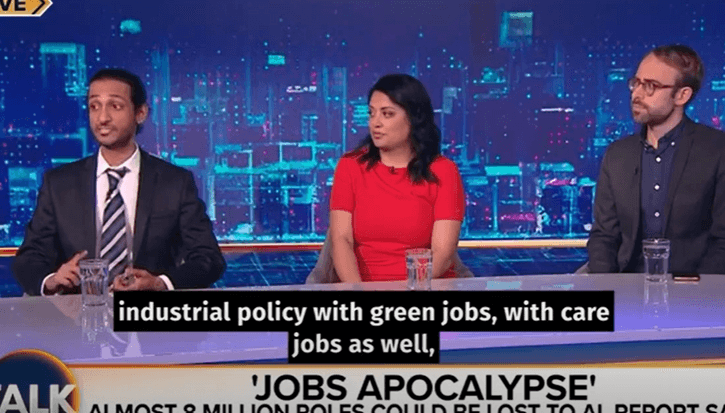What must happen now: the IPPR plan
Brexit: What must happen now – the IPPR planArticle
This morning I was very pleased to kick off IPPR's series of speaking events on the future of Britain in Europe. Our series will bring together significant figures from across the political spectrum and across the UK, including Conservative, Labour, Liberal Democrat and SNP viewpoints.
In introducing our first speaker, former prime minister Gordon Brown, I set out IPPR's plan for immediate action in these uncertain days. You can download my speech, read the full text below, listen to it as a podcast, or watch video of both my and Gordon Brown's speech here.
{{ getMedia("id=210", "height=250","ignoreCaption=1") }}
At this moment, Britain finds itself in the greatest peacetime political, constitutional and economic crisis in our history.
The economic shocks continue to reverberate globally.
The world has watched in disbelief.
In what feels like a revolutionary moment, I hope you will permit me to quote a revolutionary.
And, no, I’m not talking about Jeremy Corbyn.
'There are decades where nothing happens; and there are weeks where decades happen.'
Many British people have experienced those lost decades. Across our country, a huge gulf has opened up between the lives many expected to lead, and the reality of life as it is now experienced.
When unhappiness at that disconnect is turned inwards, it can turn to despair. When it is turned outwards, what begins as frustration quickly moves to anger and rises up to rage.
And those sentiments have not been met with sufficient political action.
That is what it means to be dispossessed.
This referendum was more about daily life in modern Britain than about our membership of the European Union.
The people have not just spoken, they have shouted.
The sneering from Remain supporters that Leave voters had voted against their economic interest out of 'ignorance' or 'stupidity' has been predictable and profoundly misguided.
Many Leave voters believed that the economy was already not working for them, but for a remote elite.
As one Leave supporter said to me before the vote: 'I’m already in recession, and it will hurt them more than it hurts me'.
But more than that, this economic determinism takes no account of culture nor identity. It contains no respect for what matters in people’s lives.
Well, we are now in the weeks when decades happen.
Our country is crying out for leadership and all it hears is a deafening silence from Westminster.
Never have our challenges appeared so great and our leaders so small.
And yet, at this moment in our history, we must demand that our politicians be statesmen and stateswomen.
We must insist that they rise to meet the measure of this moment.
That is why today, IPPR proposes that the summer parliamentary recess is cancelled.
Politicians were elected to lead. Parliament should sit through the coming months to meet our country’s challenges. It is the only responsible course of action.
At IPPR, we have put our heads together and identified what we believe must happen now.
First, we must address the urgent questions of citizenship. Emergency legislation should be introduced granting all European Union citizens already legally resident in the United Kingdom indefinite leave to remain.
That would be the most powerful stand against racism and xenophobia.
Contrary to the claims of the Leave campaign, the biggest threat to the NHS is not the money we pay into the EU, but the risk of losing one in 10 NHS staff, and the dire consequences that would have for essential services.
And so, in recognition of their service to our country, we believe that all European Union staff working in the NHS should be offered British citizenship, so that they are able to be dual citizens.
Second, we must deal with the democratic chasm that has opened. We believe a confidence vote in the government should take place, and a general election should be called for the autumn.
Third, we must have credible negotiations with our European partners. It should be a new UK government that leads the negotiations with the European Union.
And we believe that the UK government should support the Scottish government in any EU discussions which it wishes to be involved in.
Fourth, we must have urgent economic action. It is imperative that the new UK government does not focus on Brexit negotiations at the expense stewardship of the economy.
Self-defeating austerity has left Britain on the brink. Brexit looks like it has pushed us over the edge.
We need a decisive shift in policy to ameliorate the worst impacts of the recession that appears to be on the horizon, and to avoid past mistakes.
As soon as a new UK government is formed, the new chancellor should go to parliament and announce a revision to the fiscal charter.
The Treasury should rapidly accelerate investment in public infrastructure and in housing. But there must also be investment in people: in schools and skills, health and care, further and higher education.
Crucially, a bill should be introduced to create a British investment bank. As business investment dries up, government must shoulder the burden.
And that investment should be focused in the parts of the country in greatest need – in precisely the post-industrial regions that voted so strongly for Leave.
Finally, looking ahead, the new government should also recognise that people are fearful about their wages and their jobs.
We believe legislation should be passed that guarantees all existing worker rights that originate from the EU.
Moreover, we believe that the UK should automatically adopt all European improvements to worker’s rights too.
We do not want this country to lead a race to the bottom.
In the longer term, there is an enormous task for progressive politics to reconnect with the people who voted to Leave.
Our people no longer speak to each other, they speak past each other.
We will need to come together across all the nations of the United Kingdom and heal.
If we are to close the gap between the lives people expected to lead, and the reality of lives actually led, then we will need deep reforms to British capitalism, British society, and British democracy.
For that reason, in the coming months, IPPR will launch the Commission on Economic Justice. It will bring together leaders in business, in the union movement, and in wider society to chart a path to a progressive future.
At the end of The Wasteland, his greatest work, TS Eliot speaks of ‘these fragments I have shored against my ruins’.
As we seek to pull our country back together again, we need more than fragments.
We need leadership.
That is why IPPR is creating space for major political leaders across all parties throughout the UK to address Britain’s future.
Gordon Brown, as the former prime minister, is our first speaker. Speakers from the Scottish National party, the Conservative party, and the Liberal Democrats have also agreed to address IPPR.
During the referendum campaign, Gordon Brown memorably demanded that our country should be leading Europe, not leaving Europe.
As prime minister, he steered the ship of state through the financial crisis.
His passion and energy and vision galvanised the leaders of the G20 to action to save the global financial system, and to avoid a recession becoming a depression.
Today, at this crucial moment, he will speak to us about the future of Britain in Europe.
As a former prime minister and one of the longest serving chancellors in our history, he has a vital contribution to make to understanding where we go from here.
Related items

Who gets a good deal? Revealing public attitudes to transport in Great Britain
Transport isn’t working. That’s the message from the British public. This is especially true if you’re on a low income, disabled or living in the countryside. The cost of living crisis has exposed the shortcomings of our transport system,…
Bhargav Srinivasa Desikan on TalkTV discussing AI
IPPR's Bhargav Srinivasa Desikan on TalkTV discussing his new report on the impact of generative AI on the UK labour market.
Transformed by AI: How generative artificial intelligence could affect work in the UK – and how to manage it
Technological change is a good thing. It has brought exponential gains to living standards and is the foundation of modern society. Yet unmanaged technological change has always come with risks and disruptions.